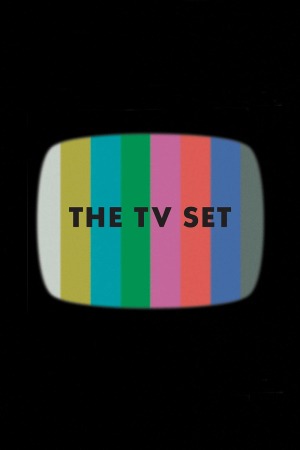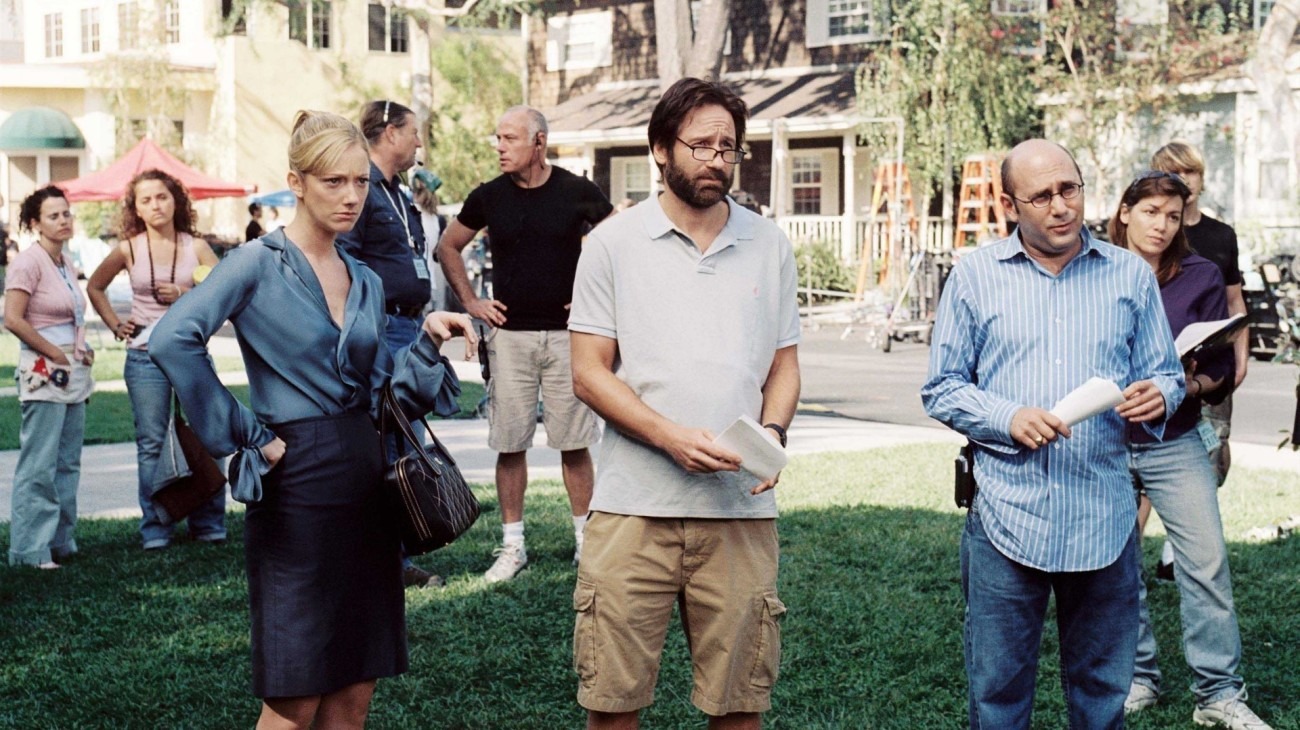
The little picture
Talk about your refreshing changes from the ordinary! Jake Kasdan, veteran of Freaks and Geeks, has taken his unique insight into the inner workings of network television decision-making, and turned it into The TV Set, a bold new satire with the daring to tell it like it is: it's a Hollywood film that, believe it or not, goes behind the scenes - of Hollywood! And let me tell you, it's not afraid to admit that there are some warts!
...Okay, so I kid Jake Kasdan, but only because I love Jake Kasdan. After all, he directed Orange County. What have I ever done? And truth be told, The TV Set isn't at all bad. Make no mistake, it is profoundly unimaginative in its treatment of the film industry's favorite topic, the film industry, but that doesn't mean that it doesn't do a fine job of re-covering very well-trod ground.
David Duchovny stars as Mike Klein, a struggling writer with an idea for a tragicomedy series titled The Wexler Chronicles, based on Klein's own experience coping with his brother's suicide. Over the course of a couple of months during that hellish springtime ritual known as "pilot season," he is given note upon note from two executives at PDN, the "Panda Network": the glum BBC acquisition Richard McAllister (Ioan Gruffudd), and the infinitely fake and peppy Lenny (Sigourney Weaver). Thus does the bittersweet personal project become a broad sitcom with a wilfully generic title and fart jokes.
You'd swear to look at it that this is a comedy,* and that's pretty much the only word that fits, but that doesn't change the fact that The TV Set isn't particularly funny and doesn't want to be. Essentially, it's a classically-structured tragedy: Mike Klein is a great man, praised by the network for his quick mind and large talent, but through a single flaw, he is brought down. Where the ancient Greeks had hubris, Klein has a colossal lack of fortitude.
A variation on the same scene occurs over and over again: Mike declares that he must stand on his principles; the executives agree; they communicate to Mike via his terrified manager Alice (played by Judy Greer, as she more or less had to be) that they need him to compromise on this little wee point; after much dithering and shouting at Alice and his pregnant wife Natalie (Justine Bateman), Mike gives in.
It is the story of a death by a thousand cuts, by turns funny and terrifying, ending in a really great moment of performance by Duchovny when Mike realises that his long nightmare of compromise and self-loathing has done nothing more than open the door for 21 episodes of exactly the same thing. A nice guy has willingly tossed himself into a cage, selling out his basic core beliefs; it's not such a satire of Hollywood as it is a cruel joke on the many people in the world who have done precisely the same thing. For that uncomfortable truth, I salute The TV Set without reservation.
That's a matter of theme, though, and in terms of raw execution, there's no denying that these notes have been played over and over again. And let us be perfectly honest: not only has the Hollywood satire been done to death, but it's been perfected. The best that any new entrant in the genre can hope for is to add the occasional joke or observation that fits well and isn't totally clichéd. The TV Set achieves that, more often than not; my personal favorite bit is the extremely accurate sequence during the production of the pilot, when it becomes increasingly clear that the only person on set with any idea of what is going on is the cinematographer (M.C. Gainey, who since shooting this film has gained some first-hand experience with TV series foundering under creative misdirection). And perhaps the smartest single choice - it's not accurate to call it a gag - was casting Gruffudd as McAllister and Lucy Davis as his wife; no better way to establish the superiority of the British model of television production to the American model than by, y'know, reminding us of British superiority. (Justine Bateman, with her Arrested Development guest appearance, does something similar, but the filmmakers could hardly have known that at the time).
Really, there's nothing "wrong" with the film besides excessive boredom. The actors are all great, Weaver especially, but you can never shake the feeling that they're taking their cues from a dozen other characters, Weaver especially (it's a brilliant performance, that feels like a pitch-perfect clone of Faye Dunaway in Network, although I'd never hold that against the actress. It's just good to see her in a major role again). I will say this in the film's favor: it happily avoids grotesqueries in favor of a nearly documentary realism. Which of course makes the funny tragic. That's a compliment. Anyone can make us laugh at exaggeration, but looking us in the eye once we finish laughing, and making us realize that it was the stone-cold truth, that takes some modest skill and boldness. The TV Set is not a backstage film for the ages, but it manages to be a bit more useful than the vast bulk of its stablemates.
7/10
...Okay, so I kid Jake Kasdan, but only because I love Jake Kasdan. After all, he directed Orange County. What have I ever done? And truth be told, The TV Set isn't at all bad. Make no mistake, it is profoundly unimaginative in its treatment of the film industry's favorite topic, the film industry, but that doesn't mean that it doesn't do a fine job of re-covering very well-trod ground.
David Duchovny stars as Mike Klein, a struggling writer with an idea for a tragicomedy series titled The Wexler Chronicles, based on Klein's own experience coping with his brother's suicide. Over the course of a couple of months during that hellish springtime ritual known as "pilot season," he is given note upon note from two executives at PDN, the "Panda Network": the glum BBC acquisition Richard McAllister (Ioan Gruffudd), and the infinitely fake and peppy Lenny (Sigourney Weaver). Thus does the bittersweet personal project become a broad sitcom with a wilfully generic title and fart jokes.
You'd swear to look at it that this is a comedy,* and that's pretty much the only word that fits, but that doesn't change the fact that The TV Set isn't particularly funny and doesn't want to be. Essentially, it's a classically-structured tragedy: Mike Klein is a great man, praised by the network for his quick mind and large talent, but through a single flaw, he is brought down. Where the ancient Greeks had hubris, Klein has a colossal lack of fortitude.
A variation on the same scene occurs over and over again: Mike declares that he must stand on his principles; the executives agree; they communicate to Mike via his terrified manager Alice (played by Judy Greer, as she more or less had to be) that they need him to compromise on this little wee point; after much dithering and shouting at Alice and his pregnant wife Natalie (Justine Bateman), Mike gives in.
It is the story of a death by a thousand cuts, by turns funny and terrifying, ending in a really great moment of performance by Duchovny when Mike realises that his long nightmare of compromise and self-loathing has done nothing more than open the door for 21 episodes of exactly the same thing. A nice guy has willingly tossed himself into a cage, selling out his basic core beliefs; it's not such a satire of Hollywood as it is a cruel joke on the many people in the world who have done precisely the same thing. For that uncomfortable truth, I salute The TV Set without reservation.
That's a matter of theme, though, and in terms of raw execution, there's no denying that these notes have been played over and over again. And let us be perfectly honest: not only has the Hollywood satire been done to death, but it's been perfected. The best that any new entrant in the genre can hope for is to add the occasional joke or observation that fits well and isn't totally clichéd. The TV Set achieves that, more often than not; my personal favorite bit is the extremely accurate sequence during the production of the pilot, when it becomes increasingly clear that the only person on set with any idea of what is going on is the cinematographer (M.C. Gainey, who since shooting this film has gained some first-hand experience with TV series foundering under creative misdirection). And perhaps the smartest single choice - it's not accurate to call it a gag - was casting Gruffudd as McAllister and Lucy Davis as his wife; no better way to establish the superiority of the British model of television production to the American model than by, y'know, reminding us of British superiority. (Justine Bateman, with her Arrested Development guest appearance, does something similar, but the filmmakers could hardly have known that at the time).
Really, there's nothing "wrong" with the film besides excessive boredom. The actors are all great, Weaver especially, but you can never shake the feeling that they're taking their cues from a dozen other characters, Weaver especially (it's a brilliant performance, that feels like a pitch-perfect clone of Faye Dunaway in Network, although I'd never hold that against the actress. It's just good to see her in a major role again). I will say this in the film's favor: it happily avoids grotesqueries in favor of a nearly documentary realism. Which of course makes the funny tragic. That's a compliment. Anyone can make us laugh at exaggeration, but looking us in the eye once we finish laughing, and making us realize that it was the stone-cold truth, that takes some modest skill and boldness. The TV Set is not a backstage film for the ages, but it manages to be a bit more useful than the vast bulk of its stablemates.
7/10
Categories: indies and pseudo-indies, satire






